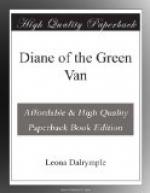The fish began to sizzle violently. Considerably aggrieved by a variety of unexpected developments in the pan, Philip harpooned the smoking segments with indignant vim, burned his fingers, made reckless use of the wounded arm and regretfully resigned the task to Johnny who furtively bestowed certain hot sable portions of the rescued fish upon the dogs, thereby arousing a snarling commotion of intense surprise.
“That’s a wonderful bed of mine,” commented Philip at breakfast. “Tell me where in the world did you get your camp equipment?”
“I made the bed myself,” said Diane happily, “of red willow shoots from the swamp, and I carved these forks and spoons out of wood Johnny gathered.”
“I do wish I were clever!” grumbled Philip in acute discontent. “After breakfast I’m going to whittle out a wildwood pipe and make a birch canoe, and likely I’ll weave a rush mat and a willow bed and carve some spoons and forks and a sundial.”
“Will you be through by noon?” asked Diane politely.
Philip laughed.
“As a matter of fact,” he said easily, “I’m going with you to lamp birds. I want to duck that fool doctor.”
“You’ll do nothing of the sort,” said Diane with decision, “for I’m going to stay in camp and bake bread.”
The bread was baking odorously and a variety of shavings flying ambitiously from an embryo pipe by ten o’clock. At noon the doctor had not yet arrived. Philip dexterously served a savory fish chowder from a pot hanging within a tripod of saplings and refused to dwell upon the thought of his eventual departure.
A man appeared among the trees to the east, switching absently at the underbrush with a cane.
Philip sniffed.
“I thought so,” he nodded. “That medical dub carries a cane on his professional rounds! Like as not he wears a flowing tie, a monocle and pink socks.”
The man approached and raised his hat, smiling urbanely. It was Baron Tregar.
Philip leaped to his feet, reddening.
“Excellency!” he stammered.
“Pray be seated!” exclaimed the Baron with sympathy. “Such a disturbing experience as you have had affords one privileges.”
“Permit me,” said Philip uncomfortably to Diane, “to present my chief, Baron Tregar. Excellency, Miss Westfall, to whom I am eternally indebted.” And Philip’s eyes sparkled with laughter as he uttered her name.
There was an old world courtliness in the Baron’s bow and murmured salutation.
“Ah,” said he with gallant regret, “Fate, Miss Westfall, has never seen fit to temper misfortune so pleasantly for me. Poynter, you have been exceedingly fortunate.”
Diane laughed softly. It was hers to triumph now.
“Mr. Poynter,” she said with relish, flashing a sidelong glance at that discomfited young man, “Mr. Poynter has been good enough to make the chowder. It would gratify me exceedingly, Baron Tregar, to have you test it.”




